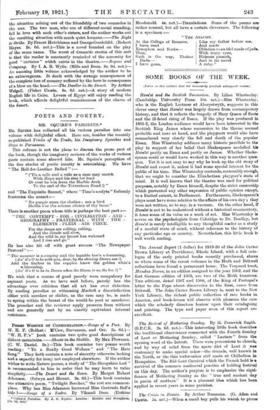SO-ME BOOKS OF THE WEEK.
iNblice in this column does not necessarily preclude subsequent review) Hamlet and the Scottish Succession. By Lilian Winstanley. (Cambridge University Press. 10s. net.)—Miss Winstanley, who is the English Lecturer at Aberystwyth, suggests in this clever essay that Hamlet was largely drawn from contemporary history, and that it reflects the tragedy of Mary Queen of Soots and the ill-fated rising of Essex. If the play was produced hi 1601-2, the London audience would have been interested in the Scottish King James whose succession to the throne seemed probable and near at hand, and the playgoers would also have remembered very clearly the fall and death of the popular Essex. Miss Winstanley adduces many historic parallels to the play in support of her belief that Shakespeare modelled his Hamlet partly on Essex and partly on James. Whether Shake- speare could or would have worked in this way is another ques- tion. Yet it is not easy to say why he took up the old story of Hamlet and recast it, unless it had some special interest for the public of his time. Miss Winstanley contends, reasonably enough, that we ought to consider the Elirabothan playgoer's state of mind. It is well known that the theatre was used for political purposes, notably by Essex himself, despite the strict censorship which prevented any other expression of public opinion except, to-a limited extent, in Parliament. Furthermore, Shakespeare's plays must have some relation to the affairs of his own day ; they were not written, so to say, in a vacuum. On the -other hand, if Hamlet is not to be understood without a historical commentary, it loses some of its value as a work of art. Miss Winstanley is severe on the psychologists from Coleridge to Dr. Bradley, but Hamlet is surely intelligible to any thoughtful reader as a study of a morbid state of mind, without reference to the history of any particular age or country. Nevertheless, this little book is well worth reading.


































 Previous page
Previous page